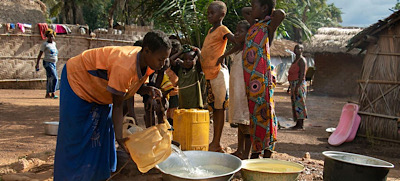UN Condemns Attacks On Humanitarian Organisations In Central African Republic
The Central African Republic is increasingly becoming one of the most difficult places for humanitarian workers to be in, as new attacks on aid workers surface.

The United Nations Organisation has “firmly condemned” two attacks against humanitarian organisations in the Central African Republic which took place on April 7 and 9, 2022.
During the attacks, six humanitarian workers and one staff of a health centre, were wounded while on mission in the south of the country.
Denise Brown, the UN Humanitarian Coordinator in the Central African Republic, on Wednesday, April 20, said the UN was “profoundly shocked and consternated by these two attacks perpetrated by armed individuals against humanitarian organisations”.
The humanitarian organisation, Action Against Hunger, had announced last Friday that it was suspending part of its activities in the prefecture of Basse-Kotto in the south of the Central African Republic following an attack on one of its vehicles during which five persons were wounded.
This involves mainly the suspension of the activities of its mobile clinics as well as activities aimed at ameliorating access to potable water for 11,000 people in the interior zones of the Basse-Kotto prefecture, including children and pregnant women.
“Each time that humanitarians are targeted, the lives of thousands of vulnerable persons are in danger. The humanitarians who struggle to assist the local populations under extremely difficult conditions do not have to be attacked,” Brown said in a statement.
The Central African Republic is one of the most difficult countries in the world for humanitarian workers. Between Jan. 1 and April 15, 2022, 43 incidents affecting humanitarian organisations were recorded during which 11 humanitarian workers were wounded.
According to the United Nations, at least one incident per day against humanitarian workers was recorded in 2021 in the country, half of which were thefts, hold-ups, and intrusions into humanitarian facilities.
These incidents disturbed the transportation of humanitarian assistance on which more than half the population of the Central African Republic depends.
The humanitarian incidents occurred while 3.1 million persons were in need of humanitarian assistance and protection in the country this year, a figure which amounts to 63 per cent of the population. About 2.2 million of this number are in dire need and may not survive without the necessary protection and assistance.
In spite of a difficult and dangerous operational environment, humanitarian actors in 2021 assisted 1.8 million persons in emergency situations.
“Civilians remain the first victims in the conflict in the Central African Republic and humanitarian aid is a question of life and death for millions of persons. The humanitarian workers who come to their assistance in all neutrality and impartiality must benefit from free access and in total security,” the UN Humanitarian Coordinator declared.
Support Our Journalism
There are millions of ordinary people affected by conflict in Africa whose stories are missing in the mainstream media. HumAngle is determined to tell those challenging and under-reported stories, hoping that the people impacted by these conflicts will find the safety and security they deserve.
To ensure that we continue to provide public service coverage, we have a small favour to ask you. We want you to be part of our journalistic endeavour by contributing a token to us.
Your donation will further promote a robust, free, and independent media.
Donate HereStay Closer To The Stories That Matter




